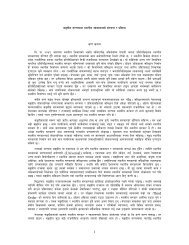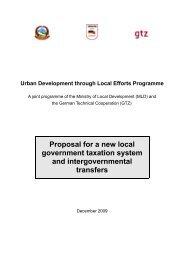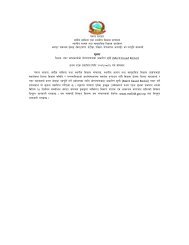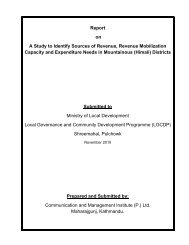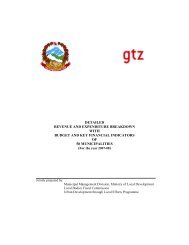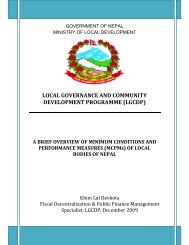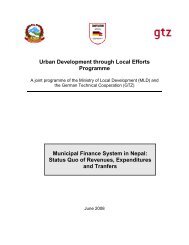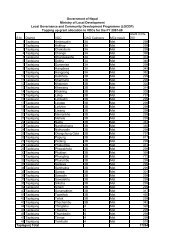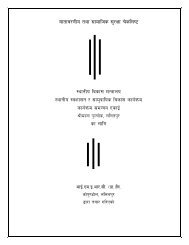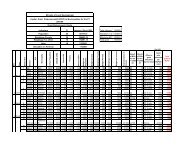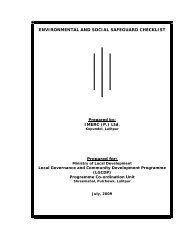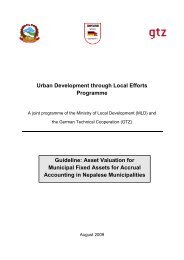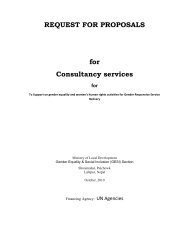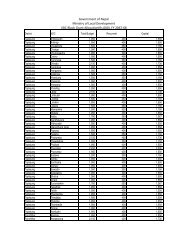GTZ Report on Accrual Accounting Status Quo - LGCDP
GTZ Report on Accrual Accounting Status Quo - LGCDP
GTZ Report on Accrual Accounting Status Quo - LGCDP
Create successful ePaper yourself
Turn your PDF publications into a flip-book with our unique Google optimized e-Paper software.
How to implement <strong>Accrual</strong> <strong>Accounting</strong> 22<br />
• Currently the Comptroller General Office does not accept accrual based financial statements for external auditing purposes. This indicates that<br />
existing procedures between the local and central level of government are not matched and have to be revised.<br />
• A Nepal Public <strong>Accrual</strong> <strong>Accounting</strong> Standard should be developed according to IPSAS and the Nepal <strong>Accounting</strong> Standard (NAS).<br />
• Regulati<strong>on</strong>s must acknowledge the different starting points and experiences of the municipalities in accrual accounting (see p.18-19).<br />
• An efficient auditing and m<strong>on</strong>itoring of the implementati<strong>on</strong> process combined with selected support is essential for the success of the accrual<br />
accounting implementati<strong>on</strong>.<br />
• The term Corporate <strong>Accounting</strong> System or “CAS” should be revised since it implies that public and private accounting are identical, which<br />
however is not the case.<br />
<strong>Accrual</strong> <strong>Accounting</strong> Guidelines and Manuals<br />
• <strong>Accrual</strong> accounting guidelines and manuals are supposed to close the gap between the developed public accrual accounting<br />
regulati<strong>on</strong>s/standards and the practical implementati<strong>on</strong>, transiti<strong>on</strong> period and operati<strong>on</strong> (see also IPSASB, 2003 and IMF, 2007).<br />
• Specific technical accrual accounting guidelines and manuals which address not <strong>on</strong>ly accrual accounting in general but also the transiti<strong>on</strong> or<br />
implementati<strong>on</strong> are necessary. This is an important less<strong>on</strong> learnt since there needs to be more clarity <strong>on</strong> how to proceed during the<br />
implementati<strong>on</strong> process. Informati<strong>on</strong> must be provided <strong>on</strong> difficult issues like the valuati<strong>on</strong> methods of specific asset types, inventory,<br />
depreciati<strong>on</strong>s, debt management, revenue management, opening balance sheet, closing balance sheet, and other financial statements.<br />
• The guidelines should use standardized methods for each accrual accounting comp<strong>on</strong>ent, e.g. in the valuati<strong>on</strong> of certain asset types, since many<br />
different methods will be misleading and would be an obstacle to achieve a certain quality standard of accrual accounting across Nepal.<br />
C<strong>on</strong>ceptual Clarity<br />
• During past reforms municipal staff was not sufficiently trained and informed about the characteristics, the meaning, the scope and the<br />
envir<strong>on</strong>ment of accrual accounting.<br />
• One has to ensure that the accounting staff is capable of using and understanding the manual accrual accounting practise. Only after that<br />
software training and following project phases should be started<br />
• Also in this case it is important to acknowledge the different starting points and needs of the municipalities before a possible accrual accounting<br />
implementati<strong>on</strong><br />
c<strong>on</strong>sultants<br />
Who is supporting<br />
Udle (MLD-<str<strong>on</strong>g>GTZ</str<strong>on</strong>g>),<br />
Comptroller General<br />
Office, the Institute of<br />
Chartered Accountants,<br />
LBFC, MuAN, ,<br />
c<strong>on</strong>sultants<br />
Who is supporting<br />
Udle (MLD-<str<strong>on</strong>g>GTZ</str<strong>on</strong>g>),<br />
Comptroller General<br />
Office, MuAN



